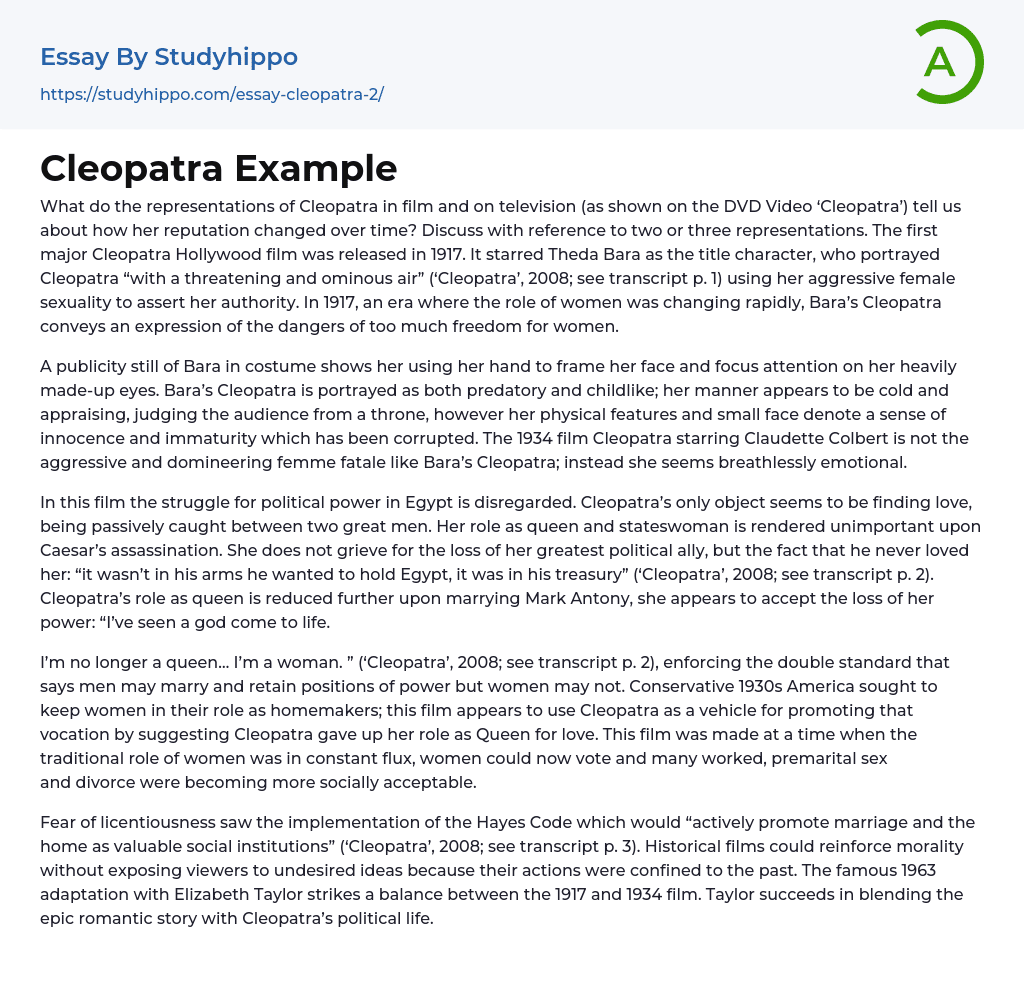What do the representations of Cleopatra in film and on television (as shown on the DVD Video ‘Cleopatra’) tell us about how her reputation changed over time? Discuss with reference to two or three representations. The first major Cleopatra Hollywood film was released in 1917. It starred Theda Bara as the title character, who portrayed Cleopatra “with a threatening and ominous air” (‘Cleopatra’, 2008; see transcript p. 1) using her aggressive female sexuality to assert her authority. In 1917, an era where the role of women was changing rapidly, Bara’s Cleopatra conveys an expression of the dangers of too much freedom for women.
A publicity still of Bara in costume shows her using her hand to frame her face and focus attention on her heavily made-up eyes. Bara’s Cleopatra is portrayed as both predatory an
...d childlike; her manner appears to be cold and appraising, judging the audience from a throne, however her physical features and small face denote a sense of innocence and immaturity which has been corrupted. The 1934 film Cleopatra starring Claudette Colbert is not the aggressive and domineering femme fatale like Bara’s Cleopatra; instead she seems breathlessly emotional.
In this film the struggle for political power in Egypt is disregarded. Cleopatra’s only object seems to be finding love, being passively caught between two great men. Her role as queen and stateswoman is rendered unimportant upon Caesar’s assassination. She does not grieve for the loss of her greatest political ally, but the fact that he never loved her: “it wasn’t in his arms he wanted to hold Egypt, it was in his treasury” (‘Cleopatra’, 2008; see transcript p. 2).
Cleopatra’s role as queen is reduced further upon marrying Mark Antony, she appears to accept the loss of her power: “I’ve seen a god come to life.
I’m no longer a queen… I’m a woman. ” (‘Cleopatra’, 2008; see transcript p. 2), enforcing the double standard that says men may marry and retain positions of power but women may not. Conservative 1930s America sought to keep women in their role as homemakers; this film appears to use Cleopatra as a vehicle for promoting that vocation by suggesting Cleopatra gave up her role as Queen for love. This film was made at a time when the traditional role of women was in constant flux, women could now vote and many worked, premarital sex and divorce were becoming more socially acceptable.
Fear of licentiousness saw the implementation of the Hayes Code which would “actively promote marriage and the home as valuable social institutions” (‘Cleopatra’, 2008; see transcript p. 3). Historical films could reinforce morality without exposing viewers to undesired ideas because their actions were confined to the past. The famous 1963 adaptation with Elizabeth Taylor strikes a balance between the 1917 and 1934 film. Taylor succeeds in blending the epic romantic story with Cleopatra’s political life.
Cleopatra is shown as an opulent cunning stateswoman who uses her imperious nature to subdue opponents. Taylor’s Cleopatra demonstrates modern influences from institutions such as the United Nations and contemporary figures like John F. Kennedy when talking to Caesar where she wishes for greater cooperation with other countries “one people on Earth, living in peace” (Cleopatra, 1963, in ‘Cleopatra’, 2008; see transcript p. 4). Romance is still prominent in
the film; Taylor and her co-star Burton’s romance seemed to blur the lines between the historical and the contemporary.
- Abolitionism essays
- Adam Smith essays
- American History essays
- American Revolution essays
- Ancient Egypt essays
- Articles Of Confederation essays
- Atlantic Slave Trade essays
- Aztec essays
- Benjamin Franklin essays
- Civil Rights Act of 1964 essays
- Civil Rights Movement essays
- Civil war essays
- Cleopatra essays
- French And Indian War essays
- Gettysburg essays
- Great Depression essays
- Hurricane Katrina essays
- Industrial Revolution essays
- Jamestown essays
- Manifest Destiny essays
- Mccarthyism essays
- Patrick Henry essays
- Pearl Harbor essays
- Pocahontas essays
- Prohibition essays
- Pyramids essays
- Salem Witch Trials essays
- Slavery essays
- The New Deal essays
- Thirteen Colonies essays
- Westward Expansion essays




